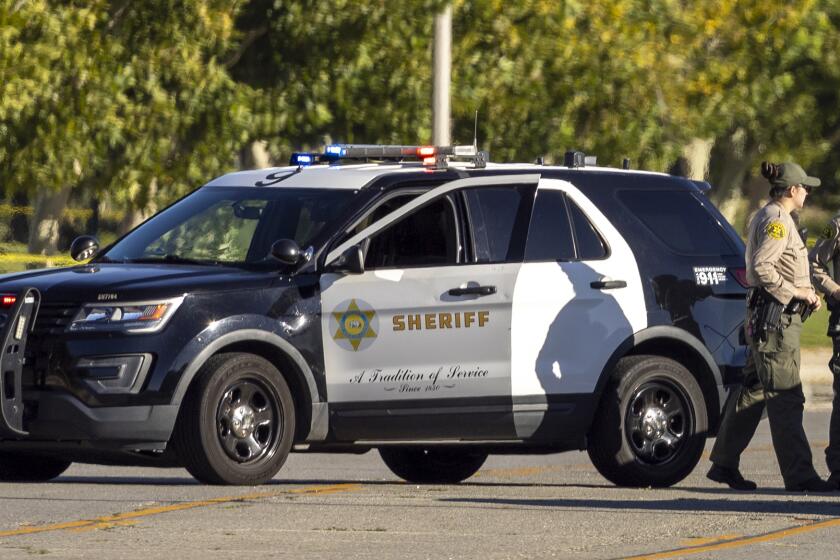UNDERSTANDING THE RIOTS--SIX MONTHS LATER : Touched by Fire / A Legacy of Pain and Hope : THE OFFICER : Lieutenant’s Call to Retreat Costs Him His Career
- Share via
For many Californians, the riots were more than a momentary blip on the screen--they were a flash point for lasting and fundamental changes in their lives. The devastation left a legacy of broken dreams for many, awakened a sense of social justice in some, unleashed anger and hatred in others, and rekindled a spirit of hope among others. Six months after the riots, Times reporters visited some of the people and places touched by the extraordinary events of last spring and on these pages we tell their stories.
Lt. Michael Moulin, a 21-year veteran of the Los Angeles Police Department who once patrolled the streets of South Los Angeles, carefully safe guards the dozens of letters he has received since the spring riots ripped through that community and shattered his career. Occasionally, he shuffles through them, soaking up their solace.
They come from students and retirees, friends and people Moulin has never heard of, places as far-flung as Scotland and New Zealand. One or two of the authors have sharp words for Moulin, but most express sympathy for the 43-year-old lieutenant, who emerged as one of the most embattled figures of the riots.
“I just want you to know I support you in everything,” wrote one Raleigh, N.C., high school student. “I believe you were right when you told the officers to leave the area.”
The decision by Moulin--to retreat with his officers out of the area at Florence and Normandie avenues as tensions were mounting--has cost him a career he spent his entire life building. It has left him angry, confused and hurt. And it has drawn him into a lawsuit with former Police Chief Daryl F. Gates.
On the afternoon of April 29, Moulin ordered a group of 20 to 30 officers to retreat from the intersection after an angry mob began pelting them with rocks and bottles.
No one faulted Moulin for that decision, but Gates announced during a news conference a week later that Moulin should have regrouped his officers, formed into squads and gone back to protect the intersection.
“Unfortunately, he did not do that,” Gates told reporters that day. “That was a mistake.”
Gates did not name Moulin, but the lieutenant, watching the news conference at home, knew immediately that he was being singled out. So did his colleagues and so did some of the reporters who attended that briefing.
By the next day, Moulin’s name was everywhere, tarnished as the lone officer whom Gates saw fit to blame.
“I was horrified when I saw his lips say the words that they did,” Moulin said in a recent interview in his Orange County home. “I kind of watched my career and my life flash before my eyes.”
Moulin says it was not up to him to decide to retake the intersection. That was the job of his superiors, he says. He blames the lack of a riot plan for the indecision, and takes some comfort in the recent Webster Commission report, which cited the same problem.
Angered by Gates’ remarks, Moulin has filed suit, charging his former chief with slander.
In the six months since Gates’ criticism, Moulin has only made one brief reappearance at work, for about four hours. He said his doctors have told him he is suffering from a stress disability and is not ready to return; the city has responded by telling him that if he does not come back, it will cut off his paychecks.
But Moulin says he cannot imagine returning to police work under the cloud that Gates cast over him. And he cannot imagine what else he might do.
“I’ve never had any other career,” said Moulin, who said he has wanted to be a police officer since he was 8 or 9 years old. “I’ve never had another job.”
Moulin puzzles over his predicament, but he said it is his treatment by the upper echelons of the department that stirs him to rage. Not a single member of the department’s command staff has ever contacted Moulin or his family, he said.
Mayor Tom Bradley called, as did Police Commissioner Stanley K. Sheinbaum. The Rev. Cecil Murray and Urban League President John Mack each talked to Moulin at a gathering and expressed their sympathy.
But his own department’s brass has been conspicuously silent.
“I have been declared a political leper in that organization,” he said. “It was like I died.”
These days, Moulin helps out with his daughter’s basketball team. He spends some time working on his computer and he stays active in his neighborhood.
But that’s hardly a substitute for commanding officers in the streets of South Los Angeles. Moulin quietly pines for his job and for the rank-and-file officers he once led.
Some of them obviously miss him too. Among the notes that Moulin proudly displays is one from three of the officers he commanded that April afternoon.
“Just wanted to let you know we miss you,” the officers wrote. “The people who are criticizing you are the people who weren’t there. We were there, and we know we did the right thing. We are proud to be under your command and would work for you anytime.”
More to Read
Sign up for Essential California
The most important California stories and recommendations in your inbox every morning.
You may occasionally receive promotional content from the Los Angeles Times.












